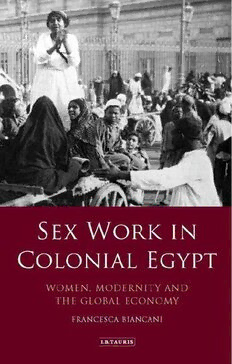
Sex Work in Colonial Egypt: Women, Modernity and the Global Economy PDF
253 Pages·2018·1.585 MB·English
Most books are stored in the elastic cloud where traffic is expensive. For this reason, we have a limit on daily download.
Preview Sex Work in Colonial Egypt: Women, Modernity and the Global Economy
Description:
In the early 20th century Cairo was a vibrant and booming global metropolis. The integration of Egypt into the global market had led to rapid urban growth and increased migration. As occupational prospects for women outside the family were limited, sex work became a prominent feature of the new modern city. However, the economic and social changes in Egypt ignited national anxieties about racial degeneration, social disorder and imperial decadence. Francesca Biancani argues here that this was a period of national crisis that became inscribed on the bodies on female sex workers. Based on a wide range of rare primary sources, including documents from court cases, reformist papers, police minutes and letters, Biancani examines the discourses around sex workers and shows how prostitution was understood in colonial Egypt. The book argues that from initially regulating and managing prostitution, local and colonial elites began to depict sex workers as a threat to the physical and moral welfare of the rising Egyptian nation. However, far from being a marginal activity, prostitution is shown to play a central role in the history of Egyptian nation-making. By exploring the interdependence of power and marginality, respectability and transgression, Biancani writes sex work and its practitioners back into the history of modern Egypt. The book is an original contribution to the global history of prostitution and a vital resource for scholars of Middle East Studies.
See more
The list of books you might like
Most books are stored in the elastic cloud where traffic is expensive. For this reason, we have a limit on daily download.
